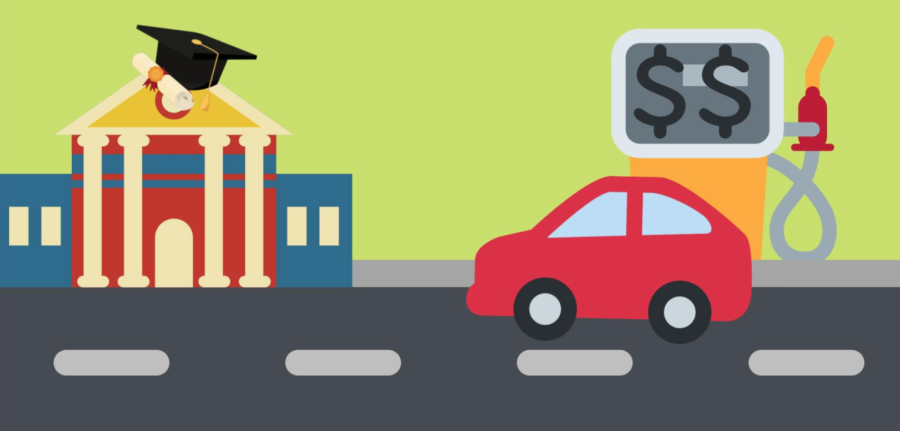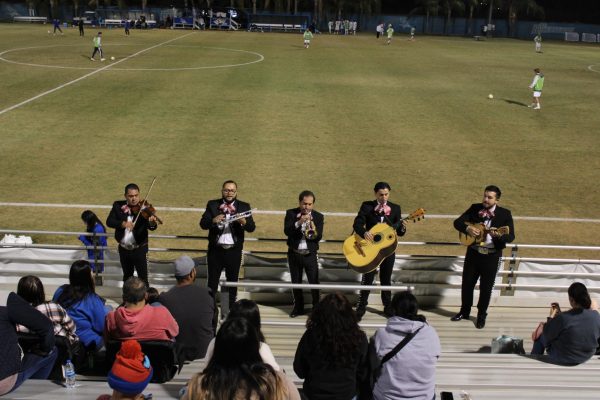Student commuters scared of soaring gas prices
April 29, 2022
As gas prices continue to soar loftier than my dreams did as a child, so does my exasperation with the matter. Admittedly, I paid no mind to the gradual increase; at first. As a California State University, Bakersfield student with courses both online and in-person, commuting to campus two days out of the week with my dear friend was nothing short of an excellent idea that heralded wondrous conversations and spectacular memories.
But now? Now it is marred by the underlying thoughts of efficiency and financial dilemmas: Do we go grocery shopping, or fill up the tank? Do we adjust our schedule to accommodate a shorter commute? Will CSUB provide some form of relief for off campus students? Is California’s new gas allowance initiative enough? Should we enroll in more online classes next semester? Will
Regardless, this all seems somewhat contrite without the appropriate context. The two largest factors to the issue of rising gas prices are the COVID-19 pandemic and the war in Ukraine. Due to the pandemic, some companies made a shift to remote work in 2020. As a result, gas prices dropped, but so did employment numbers as many more companies forced workers into unsafe working conditions and laid off hundreds of thousands. Then, Russia, one of the largest suppliers of crude oil for the US, invaded Ukraine, resulting in economic sanctions and restrictions on imports. Though, the genocide of entire people should be met with more than sanctions, but this is a complicated matter and I digress.
Now, there has been some “effort” made to alleviate the economic burden at both the federal and state level. President Biden shared “he will release roughly 1 million barrels of oil a day from the Strategic Petroleum Reserve,” per Shannon Pettypiece et al. of NBC News. That would amount to roughly 180 million barrels over the established six-month period. Perhaps that would ease the burden on Americans?
Well, during a hearing held by a subcommittee of the House Energy and Commerce Committee, it is implied that the availability of crude oil may not be the driving factor of inflated gas prices. Zack Budryk, writer for The Hill, covered the hearing and noted how Democrats “grilled” oil executives from four separate companies; Exxon, Devon, Shell, and Pioneer. The execs stated that 2020 was a “bad year” and that it somehow was affecting gas prices even two years later. While Republicans on the subcommittee dismissed the matter, Democrat members remarked how the companies had reported record high profits in 2021 and spent billions in bonuses and buybacks while laying off workers.
As for the states, several have proposed relief in the form of a temporary suspension of gas taxes, and in California, which has a massive budget surplus, Governor Newsom has proposed a $400 gas relief payment for registered vehicle owners and a temporary suspension of the gas tax, in addition to free bus fare; however, as shared by Taryn Luna, writer for the LA Times, state legislators have yet to agree on a relief plan, citing loopholes for the wealthy and the erasure of poorer citizens. Should a plan come to fruition, its effects will not be felt until this summer.
Which brings us right back to the start—as gas prices keep rising, so too does my blood pressure. Yet, it does not need to be that way, at least, not for students at CSUB. The university has several different avenues for aiding their students during this once in a lifetime event, which seems to happen every few months
Online instruction, reimbursements, and virtual events were all used over the past two years of the pandemic, and all three proved not only effective, but greatly beneficial for students and staff and faculty.
Attending courses fully online through Zoom or with a hybrid mode, which meets in-person some days and online others, granted students greater freedom and helped reduce anxieties. Students were able to work more regularly, had a better life balance, and some were even able to attend class while out of state. Of course, this also means little to no commute and hundreds saved on gas.
As for reimbursements, any sum of money granted at regular intervals is sure to bring wellness to anyone, much like those oil executives from a few paragraphs ago. These tuition reimbursements were done at the beginning of each semester, and the amount varied depending on need, but virtually –heh, puns– every student received aid. This was due to students having no in-person classes in the early months, then years, of the pandemic and paying full tuition price was not rational. Additionally, many people were on lockdown, and either were unable to work, or were laid off as a result. This would cover not just the desire to stay virtual but would also help alleviate issues with commutes and the rising gas prices.
Lastly, virtual events. While most sporting events were limited in scope, there was a greater likelihood of the event being recorded and thus enjoyed by more remotely. Campus events, such as the Runner Walk and Talk, were also held over Zoom, allowing for more people to attend, recording to be made and rewatched, and generally resulted in more student voices being heard.
I understand the want to return to “normalcy,” but “normal” wasn’t doing us any good. Rampant racism and discrimination and blatant attempts to destroy our democracy supplemented by the death of millions and a mass disabling event, followed by the erasure of entire communities and this push to risk our lives for companies’ profit isn’t something we should want to go back to. We have a very real, and very urgent, opportunity to make lasting changes for the betterment of everyone, and yes, change can be scary, but don’t fret. Take things one day, one step at a time. If you are in a position to do so, donate to relief causes and make calls to your representatives.
After all, a true, genuine act of kindness, no matter how small, will always beget another. And remember, just like the Lorax said, “Unless someone like you cares a whole awful lot, nothing is going to get better. It’s not.”







